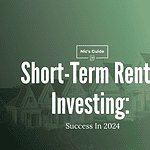Have you ever fantasized about pocketing extra cash by renting to Airbnb? The flexibility, potential income, and chance to make new connections sound exciting. But is it possible to rent to Airbnb when you don’t own the property?
While convincing your landlord can be tricky, the rewards may be worth it. Join me to learn about the profitable possibilities of renting to Airbnb. I’ll tackle common concerns, map out proven strategies for getting the green light from landlords, and explore expert tips to maximize success.
By the end, you’ll know exactly how to turn your rented space into a booking sensation. If you’re ready to unlock the profitable potential of renting to Airbnb, let’s get started! This guide will equip you with everything you need to thrive as an Airbnb host.
TL;DR
- Renting to Airbnb is a lucrative form of real estate investment.
- You can start an Airbnb business without owning property through rental arbitrage.
- Pros include extra income and flexibility, while cons involve responsibilities and legal considerations.
Renting to Airbnb
Renting to Airbnb is a form of real estate investing and an excellent way to earn extra money. You can rent out your residential property for short stays to travelers worldwide instead of having long-term tenants.
Rent to Airbnb Without Owning Rental Property
You can start an Airbnb without owning a property of your own. You can achieve this by renting a place from someone else, like an apartment, and then listing it as Airbnb for other people to rent.
It’s like you’re the middle person, and you make money by charging more for the place than you pay in rent to the original rental property owner. It is known as “rental arbitrage.”
Make sure to check with your landlord and local laws to make sure it’s allowed.
Convincing Landlord to Let You Rent on Airbnb
Talk to your landlord if you want to rent your place and use it for Airbnb. Here’s how you can convince them:
1. Plan a Meeting:
Ask your landlord for a meeting. It shows them you’re taking this seriously and want to talk face-to-face. It’s a good way to start the conversation.
2. Explain Airbnb:
Airbnb is a service where people can stay in homes like yours instead of hotels. You can tell your landlord how it works, with guests booking your place for a short time, like a vacation.
3. Benefits:
Share the good things about using Airbnb and how it will benefit your landlord because they might get a share in that extra income.
4. Rules:
Mention that you will follow all the rules, including the ones set by your landlord. It’s important to show that you’ll be a responsible host.
5. Responsible:
Explain how responsible you will be. It means taking good care of your landlord’s property. You can mention that you’ll keep everything clean and in good shape.
6. Safety:
Talk about safety. Let your landlord know that you’ll be very careful. You can say that you’ll have strict house rules to make sure guests don’t do anything dangerous.
7. Thorough Screen Guests:
Share how you’ll choose guests wisely. You won’t let just anyone in. You’ll make sure they’re responsible and won’t cause any problems.
8. Communication:
Show that you’re open to talking. Answer questions and listen to any concerns they have. Good communication is key.
9. Compromise:
Be ready to make a deal with your landlord. You can offer to share some of the money you make from Airbnb with them. It’s a way to find a fair agreement.
10. Agreement:
Make sure to get it in writing as a contract once your landlord agrees. It’s important to have everything in writing to avoid misunderstandings.
Remember to be polite and respectful throughout the conversation. Your landlord’s opinion matters, so be patient and work together to find a solution that benefits both of you.
Deal with Common Objections from the Rental Property Owner
If your landlord has concerns about renting your property on Airbnb, here are some tips to address their objections:
Offer Solutions: Address any specific concerns your landlord may have. If they worry about property damage, assure them you will take precautions by setting house rules, thoroughly screening guests, and providing your own vacation rental insurance coverage.
Provide Assurance: Offer reassurance that you will be responsible for managing the vacation rental property and handling any issues that may arise. Assure your landlord that you maintain open communication and promptly address guest-related concerns.
Share Success Stories: Share success stories with your landlord if you know of other landlords who have had positive experiences renting their properties on Airbnb. It can help relieve their concerns.
Propose a Trial Period: Suggest a trial period where you can rent your property for a limited time if your landlord hesitates. It will let them see firsthand how it works and evaluate the impact before making a long-term decision.
Maintain clear and open communication with your landlord to address objections. You can increase the chances of reaching a mutually beneficial agreement by addressing their concerns, providing solutions, and respecting their perspective.
Pros and Cons of being a Landlord
Renting out your property can be an exciting opportunity to earn extra income and meet new people. However, like any business, there are both advantages and disadvantages to consider. Here is a simple explanation of the pros and cons:
Pros of Being a Landlord
- Extra income: Renting your property on Airbnb can provide a steady source of extra income. It can help offset your expenses, allowing you to make the most of your investment property.
- Flexibility: Renting on Airbnb offers flexibility in terms of availability. You can choose when to rent out your property and block off dates when you want to use it for personal reasons. It gives you the freedom to enjoy your space while still earning income.
- Meeting new people: You can meet people from different parts of the world as an Airbnb host. You can share stories, learn about new cultures, and connect with travelers passing through your area.
- Property protection: Hosting guests through Airbnb can provide your property with an extra layer of security. With reviews and verification systems in place, there is a level of accountability that can help protect your investment.
Cons of Being a Landlord
- Increased responsibilities: Being a landlord requires time and effort. You’ll need to handle guest inquiries, coordinate check-ins and check-outs, turnover cleaning and address any issues that may arise during a guest’s stay. It can be demanding, especially during peak seasons.
- Wear and tear: Regular use of your property by different guests can increase wear and tear. You may need to invest in maintenance and repairs more frequently to keep your property in good condition.
- Legal and regulatory considerations: Depending on your location, there may be legal and regulatory requirements that you need to follow as an Airbnb host. It can include obtaining permits, paying property taxes, and following local zoning regulations.
- Uncertain income: While renting on Airbnb can be profitable, income may not always be consistent. Demand can fluctuate depending on the season or events in your area, which may impact your earnings.
Consider these advantages and drawbacks before deciding to become a landlord. Weigh the benefits against the challenges to make the right decision that aligns with your goals and lifestyle.
Looking For An Easier Way To Invest In Real Estate?
Check out SparkRental’s Co-Invest Club where you can invest passively in real estate and learn how to effectively vet deals so you know that your investments are sound and secure.
Get started with the Co-Invest Club today and start your journey towards effortless real estate investing !🏘️💼📈
Legal and Regulatory Considerations
You need to know some important legal and regulatory things when renting to Airbnb.
Here are the important things to keep in mind:
Local Laws: Research and understand your area’s local laws and regulations. Different cities and countries may have specific rules about short-term rentals.
Permits and Licensing: Some places require hosts to obtain permits or licenses before renting out their properties. Make sure to check if you need any special permissions or paperwork.
Taxes: You might have to pay taxes on the rental income you earn from your property. Consult with a tax professional or research local tax regulations to make sure that you comply with the law and explore any potential tax benefits.
Fair Housing Laws: You can’t discriminate against guests based on race, religion, or other personal things. Everyone should have an equal chance to stay at your place.
Rental Agreements: Create a clear and detailed rental agreement to protect you and your guests. This agreement should outline rules, expectations, and additional terms specific to your rental property.
Safety Regulations: Confirm the safety of your guests. Install smoke detectors, fire extinguishers, and secure locks. Familiarize yourself with your area’s safety regulations and make sure your rental properties meet those requirements.
Insurance Coverage: Contact your property insurance provider to discuss whether your current policy covers short-term rentals. Have appropriate coverage for potential damages or liabilities during a guest’s stay.
Homeowner’s Association: There might be rules about renting your place if you live in a community with a homeowner’s association. Check your association’s guidelines to avoid any issues.
Consult local authorities and professionals to verify your compliance with your area’s legal and regulatory requirements.
Conclusion
Rent to Airbnb is an exciting opportunity for both renters and landlords.
Generate additional passive income and enjoy the flexibility of managing your space by exploring this rental model.
Take proactive steps, communicate effectively with your landlord, and conduct your research before starting this business.
I’ve had several new real estate investors contact me about my properties to see if I’d be open to Airbnb arbitrage. None of those folks came with a plan or structure for a win/win. You will have a much greater chance of success if you follow these tips.
Rent to Airbnb FAQs
Is there a limit to how much rental price I can charge?
You have the freedom to set your rental price. However, it’s a good idea to research similar listings in your area to understand the market rate and adjust accordingly.
Can I hire a property management company?
Yes, you can hire a property management company to help you with your rental property. Property managers can take care of various tasks related to managing the rental property, which can save you time.
Can anyone become an Airbnb host?
Yes, most people can become Airbnb hosts. However, it’s necessary to follow local laws and regulations for short-term rentals and consider your landlord’s rules if you’re renting. Be responsible, follow the rules, and use a checklist to get started as a host on Airbnb.
Nic
Nic is an avid real estate investor who partners with her husband on hotel syndications. Prior to hotels, she owned apartment complexes and single-family homes. Her insider expertise makes her the ideal resource for those seeking to grow their income via property investments.



